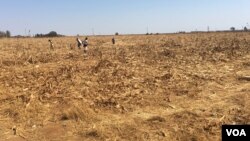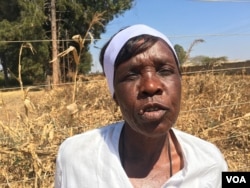The U.N. Food and Agriculture Organization, or FAO, has started distributing biofortified maize and bean seeds to farmers impacted by drought in Zimbabwe.
A good harvest in March is seen as key to helping families escape the lengthy food crisis.
"We have had two bad seasons, and a lot of farmers do not have adequate seeds,” said Chimimba David Phiri, the head of FAO for southern Africa. “We need to support the farmers to have the seed that they need for them to grow this season, and also to avoid a problem of having continued humanitarian support.
“So it is very important that farmers plant and on time so that we avert hunger for next season as well. … I do not think they can take it anymore."
Millions of people across southern Africa are dealing with food shortages as a result of El Nino-induced drought.
In March, the U.N. Children's Fund said Zimbabwe is facing its worst child malnutrition rates in 15 years. Rural areas have been hit especially hard.
The seeds being distributed are designed to produce more nutritious crops.
Farmer Mirriam Chagweja from Silobela, about 300 kilometers southwest of Harare, planted some of the biofortified maize and beans in her field in February. She obtained them as part of an initiative funded by the British government, which is also funding the FAO program.
“I would encourage others to go on board and join,” she said. “I noticed that for the beans, you get more yields compared to other ordinary varieties.”
The seed distribution program is targeting about 127,000 small-holder farm households in eight districts, before it rolls out to other parts of the country, according to FAO.





